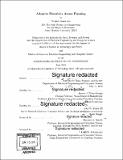Adaptive electricity access planning
Author(s)
Lee, Stephen James, S.M. Massachusetts Institute of Technology
DownloadFull printable version (47.91Mb)
Other Contributors
Massachusetts Institute of Technology. Department of Electrical Engineering and Computer Science.
Advisor
Ignacio J. Pérez-Arriaga.
Terms of use
Metadata
Show full item recordAbstract
About 1.1 billion people worldwide lack access to electricity and an additional 1 billion have unreliable access. The social ramifications of this problem are noteworthy because access to electric power has the potential to transform societies. While admirable efforts are underway, there is general consensus that progress is falling far short of what is needed to reach international electricity access goals. In light of such deficiencies, it is arguable that systems-level experimentation and innovation is required if we are to achieve universal electricity access in the next one to two decades. With the advancement of technology, new opportunities are emerging that can potentially change the game. Machine learning methods and detailed technoeconomic models for planning comprise one set of technologies that hold significant promise for accelerating access. This thesis builds upon recent work towards the development of more intelligent decision support systems for electrification planning. Progress towards automated and scalable software systems for the extraction of building footprints from satellite imagery are presented. In addition, a novel model for probabilistic data fusion and other machine learning methods are compared for electrification status estimation. Inference tools such as these allow for the cost-effective provision of granular data required by techno-economic models. We also acknowledge that the technologies we detail should not be developed in a vacuum. Given that electrification is a complex endeavor involving numerous social and technical factors, careful consideration must be given to human, policy, and regulatory concerns during the planning process. We notice how uncertainty abounds in these activities and propose "adaptive electricity access planning" as a new model-assisted framework for the explicit consideration of uncertainty in large-scale planning. This work aspires to provide valuable perspective on the importance of uncertainty in planning as these endeavors continue to evolve.
Description
Thesis: S.M. in Technology and Policy, Massachusetts Institute of Technology, School of Engineering, Institute for Data, Systems, and Society, Technology and Policy Program, 2018. Thesis: S.M., Massachusetts Institute of Technology, Department of Electrical Engineering and Computer Science, 2018. Cataloged from PDF version of thesis. Includes bibliographical references (pages 139-149).
Date issued
2018Department
Massachusetts Institute of Technology. Department of Electrical Engineering and Computer Science; Massachusetts Institute of Technology. Engineering Systems Division; Massachusetts Institute of Technology. Institute for Data, Systems, and Society; Technology and Policy ProgramPublisher
Massachusetts Institute of Technology
Keywords
Institute for Data, Systems, and Society., Technology and Policy Program., Electrical Engineering and Computer Science.